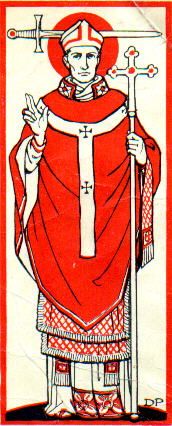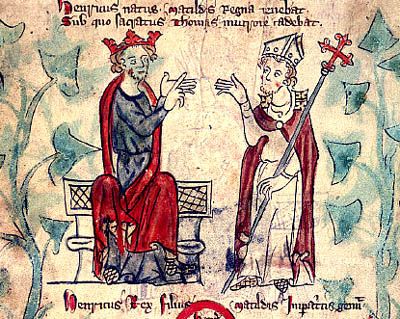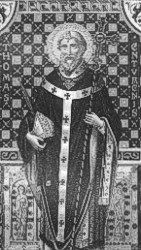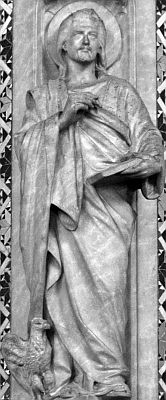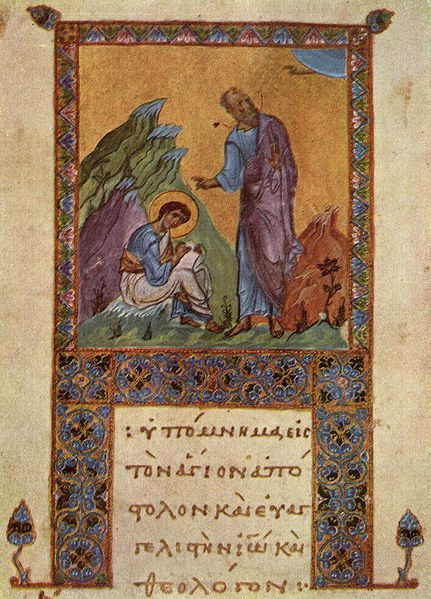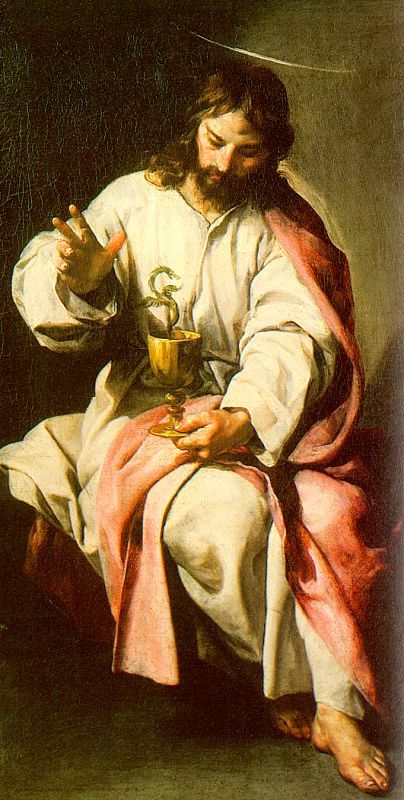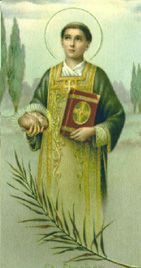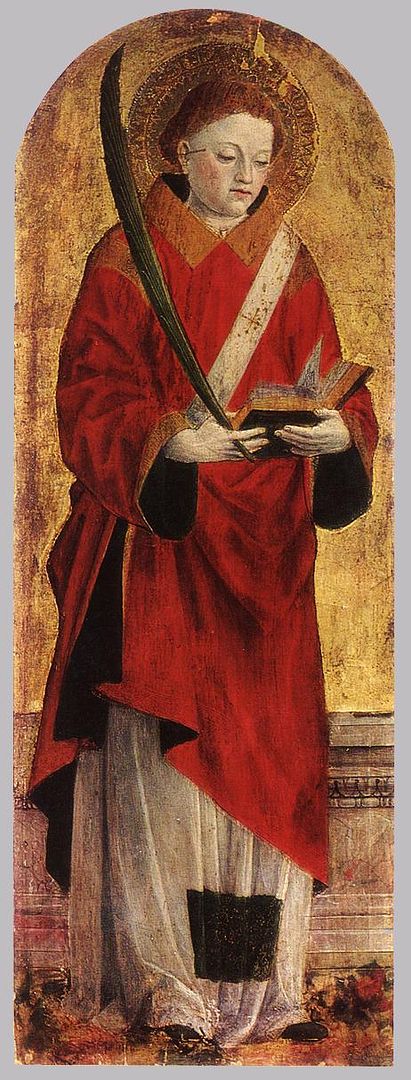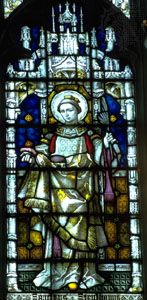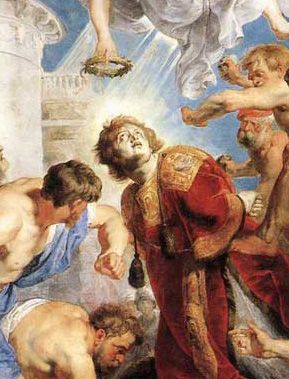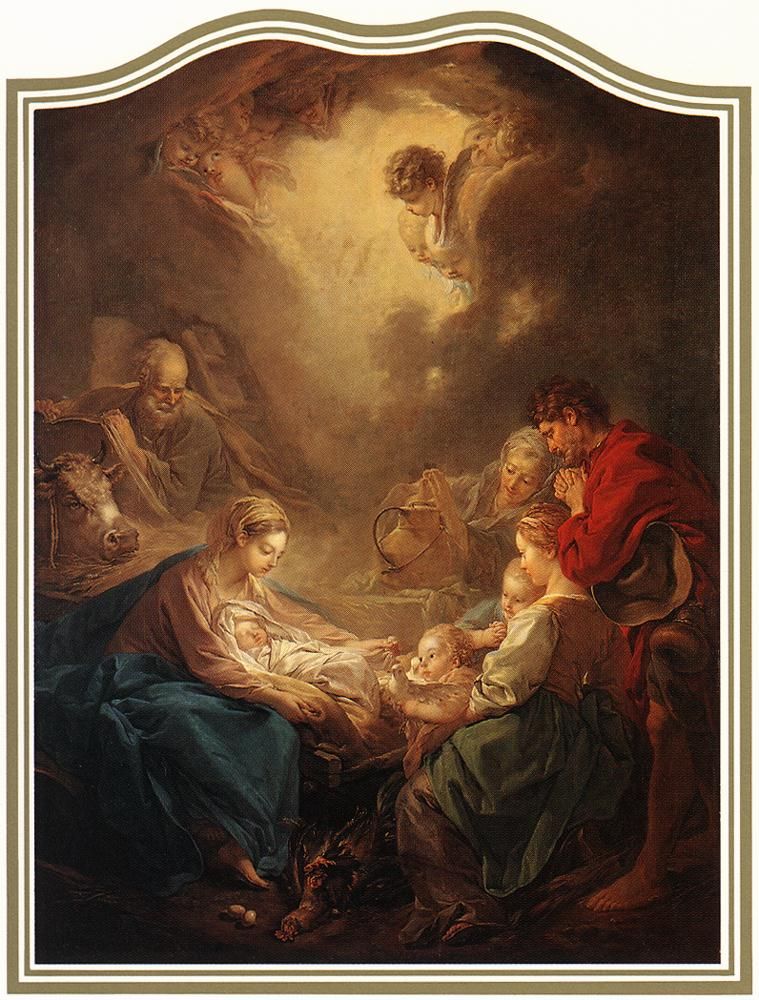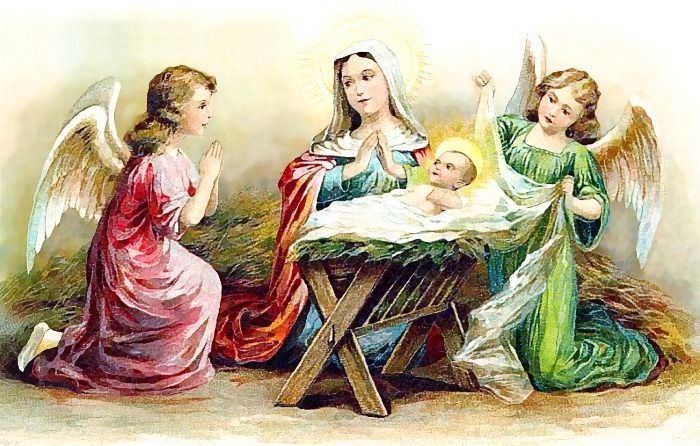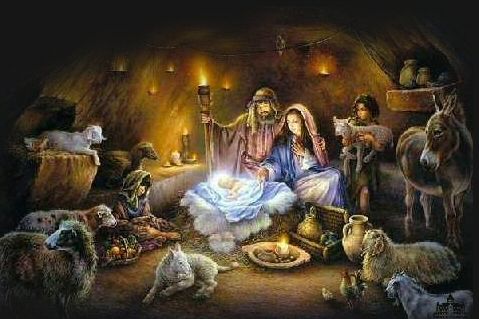The Shepherd, slain in the
midst of his flock, purchaseth
peace at the price of his blood.
O joyful mourning, O mournful joy!
The Shepherd dead, new life is in
the Flock! The Mother speaks,
through her tears, the praises of
her Son, for still he lives, the
conqueror of the sword.
Hail, O Thomas! sceptre
of justice, light of the earth,
strong champion of the Church,
beloved of the people, favourite
of the clergy! Hail, admirable
keeper of the Flock! keep in
safety all us who rejoice in
glory.
Today, December 29, we celebrate the feast day of Saint Thomas Becket (Thomas á Becket , 1117-1173), Archbishop of Canterbury, and martyr of the Church. Saint Thomas withstood pressures from King Henry II, defending the sanctity and sovereignty of the Church. His vocal opposition eventually led the angered king to exclaim, “Will no one rid me of this meddlesome priest?” upon which four knights slew him in the Cathedral of Canterbury.
Thomas was born in London to parents of Norman descent who were residing inEngland. As described in his youth in the Iceland Saga: “To look upon he was slim of growth and pale of hue, with dark hair, a long nose, and a straightly featured face. Blithe of countenance was he, winning and loveable in his conversation, frank of speech in his discourses, but slightly stuttering in his talk, so keen of discernment and understanding that he could always make difficult questions plain after a wise manner.”
Thomas attended university in Paris, clerked for the Archbishop of Canterbury, and later was sent to study canon law. He was appointed a deacon at approximately the same time that Henry II ascended to the throne of England. Upon the advice of the Archbishop, Henry appointed Thomas his chancellor, and the two grew to become good friends. Thomas embraced the life of luxury that befriending the king afforded, and willingly served alongside his commander in battle as a knight.
Upon the death of the Archbishop of Canterbury, Henry appointed Thomas to succeed him. Consecrated as bishop at the age of 45, Thomas experienced a radical spiritual change. He willingly gave up his former life of indulgence, spending his time in prayer and penance. This newfound pious life resulted in a strained relationship with the king, made worse over disagreements regarding the king’s desire to subject the Church and it’s clerics to his criminal laws and oversight. Saint Thomas actively withstood this assertion by the king, and was threatened with imprisonment and death. Wisely, he traveled to visit the Pope, seeking resolution, and finding none, exiled himself in a French monastery for seven years. During that time, he doubled his penances, spending his days in quiet contemplation and fasting. He further actively combated the expansion of the English king’s power, excommunicating those bishops in England—specifically in London—who sided with Henry.
After seven years, Thomas returned to England, to the cheers of the faithful. While he encouraged peace with the king, Thomas refused to lift the excommunications and censures against those clerics who had sided with Henry, against the Church. The irritation over Saint Thomas’ failure to acquiesce to his wishes led to the king’s famous exclamation, overheard by four knights who set upon Thomas while celebrating Mass at the cathedral.
An eyewitness named Edward Grim recounted the events which transpired next:
“After the monks took [Thomas] through the doors of the church, the four aforementioned knights followed behind with a rapid pace. A certain subdeacon, Hugh the Evil-clerk, named for his wicked offense and armed with their malice, went with them -- showing no reverence for either God or the saints because by following them he condoned their deed. When the holy archbishop entered the cathedral the monks who were glorifying God abandoned vespers -- which they had begun to celebrate for God -- and ran to their father whom they had heard was dead but they saw alive and unharmed.
They hastened to close the doors of the church in order to bar the enemies from slaughtering the bishop, but the wondrous athlete turned toward them and ordered that the doors be opened. "It is not proper," he said, "that a house of prayer, a church of Christ, be made a fortress since although it is not shut up, it serves as a fortification for his people; we will triumph over the enemy through suffering rather than by fighting -- and we come to suffer, not to resist."
Without delay the sacrilegious men entered the house of peace and reconciliation with swords drawn; indeed the sight alone as well as the rattle of arms inflicted not a small amount of horror on those who watched. And those knights who approached the confused and disordered people who had been observing vespers but, by now, had run toward the lethal spectacle exclaimed in a rage: "Where is Thomas Becket, traitor of the king and kingdom?"
No one responded and instantly they cried out more loudly, "Where is the archbishop?"
Unshaken he replied to this voice as it is written, "The righteous will be like a bold lion and free from fear," he descended from the steps to which he had been taken by the monks who were fearful of the knights and said in an adequately audible voice, "Here I am, not a traitor of the king but a priest; why do you seek me?" And [Thomas], who had previously told them that he had no fear of them added, "Here I am ready to suffer in the name of He who redeemed me with His blood; God forbid that I should flee on account of your swords or that I should depart from righteousness."
With these words -- at the foot of a pillar -- he turned to the right. On one side was the altar of the blessed mother of God, on the other the altar of the holy confessor Benedict -- through whose example and prayers he had been crucified to the world and his lusts; he endured whatever the murderers did to him with such constancy of the soul that he seemed as if he were not of flesh.
The murderers pursued him and asked, "Absolve and restore to communion those you have excommunicated and return to office those who have been suspended."
To these words [Thomas] replied, "No penance has been made, so I will not absolve them."
"Then you," they said, "will now die and will suffer what you have earned."
"And I," he said, "am prepared to die for my Lord, so that in my blood the Church will attain liberty and peace; but in the name of Almighty God I forbid that you hurt my men, either cleric or layman, in any way." The glorious martyr acted conscientiously with foresight for his men and prudently on his own behalf, so that no one near him would be hurt as he hastened toward Christ. It was fitting that the soldier of the Lord and the martyr of the Savior adhered to His words when he was sought by the impious, "If it is me you seek, let them leave."
With rapid motion they laid sacrilegious hands on him, handling and dragging him roughly outside of the walls of the church so that there they would slay him or carry him from there as a prisoner, as they later confessed. But when it was not possible to easily move him from the column, he bravely pushed one [of the knights] who was pursuing and drawing near to him; he called him a panderer saying, "Don't touch me, Rainaldus, you who owes me faith and obedience, you who foolishly follow your accomplices."
On account of the rebuff the knight was suddenly set on fire with a terrible rage and, wielding a sword against the sacred crown said, "I don't owe faith or obedience to you that is in opposition to the fealty I owe my lord king." The invincible martyr -- seeing that the hour which would bring the end to his miserable mortal life was at hand and already promised by God to be the next to receive the crown of immortality -- with his neck bent as if he were in prayer and with his joined hands elevated above -- commended himself and the cause of the Church to God, St. Mary, and the blessed martyr St. Denis.
He had barely finished speaking when the impious knight, fearing that [Thomas] would be saved by the people and escape alive, suddenly set upon him and, shaving off the summit of his crown which the sacred chrism consecrated to God, he wounded the sacrificial lamb of God in the head; the lower arm of the writer was cut by the same blow. Indeed [the writer] stood firmly with the holy archbishop, holding him in his arms -- while all the clerics and monks fled -- until the one he had raised in opposition to the blow was severed.
Behold the simplicity of the dove, behold the wisdom of the serpent in this martyr who presented his body to the killers so that he might keep his head, in other words his soul and the church, safe; nor would he devise a trick or a snare against the slayers of the flesh so that he might preserve himself because it was better that he be free from this nature! O worthy shepherd who so boldly set himself against the attacks of wolves so that the sheep might not be torn to pieces! and because he abandoned the world, the world -- wanting to overpower him -- unknowingly elevated him.
Then, with another blow received on the head, he remained firm. But with the third the stricken martyr bent his knees and elbows, offering himself as a living sacrifice, saying in a low voice, "For the Name of Jesus and the protection of the Church I am ready to embrace death."
But the third knight inflicted a grave wound on the fallen one; with this blow he shattered the sword on the stone and his crown, which was large, separated from his head so that the blood turned white from the brain yet no less did the brain turn red from the blood; it purpled the appearance of the church with the colors of the lily and the rose, the colors of the Virgin and Mother and the life and death of the confessor and martyr.
The fourth knight drove away those who were gathering so that the others could finish the murder more freely and boldly. The fifth -- not a knight but a cleric who entered with the knights -- so that a fifth blow might not be spared him who had imitated Christ in other things, placed his foot on the neck of the holy priest and precious martyr and (it is horrible to say) scattered the brains with the blood across the floor, exclaiming to the rest, "We can leave this place, knights, he will not get up again."
But during all these incredible things the martyr displayed the virtue of perseverance. Neither his hand nor clothes indicated that he had opposed a murderer -- as is often the case in human weakness; nor when stricken did he utter a word, nor did he let out a cry or a sigh, or a sign signaling any kind of pain; instead he held still the head that he had bent toward the unsheathed swords.
As his body -- which had been mingled with blood and brain -- laid on the ground as if in prayer, he placed his soul in Abraham's bosom. Having risen above himself, without doubt, out of love for the Creator and wholly striving for celestial sweetness, he easily received whatever pain, whatever malice, the bloody murderer was able to inflict. And how intrepidly -- how devotedly and courageously -- he offered himself for the murder when it was made clear that for his salvation and faith this martyr should fight for the protection of others so that the affairs of the Church might be managed according to its paternal traditions and decrees.”
News of the assassination of Saint Thomas Becket reached across Europe, and the faithful almost immediately began arriving to the cathedral in pilgrimage. Numerous miracles at the tomb of Saint Thomas followed.
Almost immediately after his death, he was canonized a saint by Pope Alexander III, and in recognition, King Henry publicly repented at the tomb, allowing himself to be scourged as penance.
Saint Thomas Becket never wavered from his faith. Following a profound realization of the presence of God, he embraced a life of penance and prayer, realizing that it is never too late to center ourselves on the Almighty. We are much the same way, coming to Jesus every day, realizing that we could better place our trust in Him, fix our gaze on Him, center our lives on Him… and not be deterred by the challenges and opposition we encounter, or the lure of worldly luxuries and temptations. Saint Thomas inspires us to lives of steadfastness and courage, marching steadily toward our heavenly home, united with Christ.
Select Quotations of Saint Thomas Becket:
"Many are needed to plant and water what has been planted now that the faith has spread so far and there are so many people...No matter who plants or waters, God gives no harvest unless what is planted is the faith of Peter and unless he agrees to his teachings."
"Remember the sufferings of Christ, the storms that were weathered...the crown that came from those sufferings which gave new radiance to the faith...All saints give testimony to the truth that without real effort, no one ever wins the crown."
“For our sake Christ offered himself to the Father upon the altar for the cross. He now looks down from heaven on our actions and secret thoughts, and one day he will give each of us the reward his deeds deserve. It must therefore be our endeavor to destroy the right of sin and death, and by nurturing faith and uprightness of life, to build up the Church of Christ into a holy temple of the Lord. The harvest is good and one reaper or even several would not suffice to gather all of it into the granary of the Lord. Yet the Roman Church remains the head of all the churches and the source of Catholic teaching. Of this there can be no doubt. Everyone know that the keys of the kingdom of heaven were given to Peter. Upon his faith and teaching the whole fabric of the Church will continue to be built until we all reach full maturity in Christ and attain to unity in faith and knowledge of the Son of God. Of course many are needed to plant and many to water now that the faith has spread so far and the population become so great. Nevertheless, no matter who plants or waters, God gives no harvest unless what he plants is the faith of Peter, and unless he himself assents to Peter’s teaching. All important questions that arise among God’s people are referred to the judgment of Peter in the person for the Roman Pontiff. Under him the ministers of Mother Church exercise the powers committed to them, each in his own sphere of responsibility. Remember then how our fathers worked out their salvation; remember the sufferings through which the Church has grown, and the storms the ship of Peter has weathered because it has Christ on board. Remember how the crown was attained by those whose sufferings gave new radiance to their faith. The whole company of saints bears witness to the unfailing truth that without real effort no one wins the crown.”
Almighty God,
You granted the martyr Thomas
the grace to give his life for the cause of justice.
By his prayers
make us willing to renounce for Christ
our life in this world
so that we may find it in heaven.
We ask this through our Lord Jesus Christ, Your Son,
who lives and reigns with you and the Holy Spirit,
one God, for ever and ever. Amen.
Year 2: Day 363 of 365
Prayer Intentions: Courage; Steadfastness; Forbearance
Requested Intentions: Healing (M); Safety, security, and sanctity for a family (A); Healing (N); Successful relationship (N); Healing of a friend; growth in the Lord (M); To hear and answer the Lord’s call (M); Healing of a friend undergoing chemotherapy (L); For the peace, safety, and holiness of a sister (J); Financial security (C); Conversion of a newly married couple (M); Peace in a family (S); Peaceful repose of departed mother (J); Blessings on a relationship (J); Financial security, successful employment (J); Obedience to God’s will (A); Conversion of souls (A); Success of business venture; faith of daughter (S); Safe return home (J); Recovery of mother and son; repose of the souls of the dearly departed (A); Blessings upon a relationship (M); Sobriety and recovery for a son (M); Employment and successful marriage (A); Employment, healing, freedom from anxiety (T); Financial security (C); Conversion (T); Peace in difficult times at work (E); Financial security and blessings for mother and children (T); Financial security for a mother (M); Health, finances, successful marriage (A); Successful resolution of court case for son (K); Continued sobriety (N); Healing of a chronic health condition (B); Successful employment (A): Peace in a family, recovery of a niece from substance use (L); Blessings on a marriage, healing of a husband (P); For the health and recovery of sisters (B); For a daughter and granddaughter (D); Blessings on overseas employment (M); Healing of mother (L).
Thursday, December 29, 2011
Tuesday, December 27, 2011
December 27: Saint John the Evangelist, "Beloved Disciple," Disciple of Charity
Saint John, Saint John was Christ's disciple,
and Evangelist also;
He for the sake of Jesus Christ
Much pains did undergo,
Because he loved our Saviour Christ,
As Holy Scriptures say,
And was belov'd of him also,
And in his bosom lay.
Saint John for love of our Saviour
Did undergo much pain
And never ceased during life
To preach Christ Jesus' name.
Saint John, he at Jerusalem
Did preach God's holy word,
And for the same the spiteful pagans
They did him cruel scourge.
Then did he for the same rejoice,
That he was counted worthy
To suffer for the sake of Christ,
And would him not deny.
To Patmos banish'd was Saint John,
As Scripture doth record,
For the testimony of Christ,
And his most holy word.
And as he was in the Spirit
On the Lord's blessed day,
Our Saviour by an Angel spake,
and unto him did say,
I am Alpha and Omega,
Which was and is to come;
And what thou seest write in a book
Thus said he to Saint John
And send it to the Churches then,
Which are in Asia seven.
And said the Angel to Saint John,
Which came to him from Heaven.
Then John turn'd him about to see,
And was astonished
At the sight of the Angel bright,
Who said, Be comforted,
For I was alive, and also dead,
Now I live for evermore,
And have the keys of death and hell;
Take comfort now therefore.
Then wretched Caesar, as 'tis said,
The Emperor Domitian,
Into a tub of boiling oil
At Rome he thrust Saint John.
Therein received he no harm,
But safely from thence came,
And died at last at Ephesus
Writing declares the same.
Saint John for love of our Saviour
Did undergo much pain
And never ceased during life
To preach Christ Jesus' name.
"We have come to know and to believe in the love God has for us. God is love, and whoever remains in love remains in God and God in him." (1 John 4:16)
Today, December 27, we the feast day of Saint John the Evangelist (died 101), the Beloved Disciple of Jesus, also known as the Disciple of Charity. Saint John preached a message of love and service to one another, a lesson he learned directly from Jesus. He persistently emphasized his followers, and still today, us, to “love one another.” It is the basis of the Christian faith: “The way we came to know love was that he laid down his life for us; so we ought to lay down our lives for our brothers.” (1 John 3:16)
John, the son of Zebedee and Salome, and the brother of Saint James the Greater, was called to follow Jesus at the onset of His public ministry. They lived as fishermen on the shores of the sea of Galilee. From what we can tell regarding the family’s livelihood, including their ability to hire help on their fishing boats, suggests that John (the younger brother) and James were living comfortably prior to their encounter with the Lord.
21 Going on from there, he saw two other brothers, James son of Zebedee and his brother John. They were in a boat with their father Zebedee, preparing their nets. Jesus called them, 22 and immediately they left the boat and their father and followed him. (Matthew 4: 21-22)
Saint John and Saint Andrew were likely followers of Saint John the Baptist, who met and spent the day with Jesus (as recounted in the Gospel of John). While we do not know what they conversed about, we can imagine that the Beloved Disciple’s heart was filled with the grace and love of Jesus on that day, setting the stage for his devotion throughout the remainder of his life!
35 The next day John was there again with two of his disciples. 36 When he saw Jesus passing by, he said, “Look, the Lamb of God!”
37 When the two disciples heard him say this, they followed Jesus. 38 Turning around, Jesus saw them following and asked, “What do you want?”
They said, “Rabbi” (which means “Teacher”), “where are you staying?”
39 “Come,” he replied, “and you will see.”
So they went and saw where he was staying, and they spent that day with him. It was about four in the afternoon. (John 1: 35-39)
Saint John followed Jesus, was with him at the wedding miracle in Cana, witnessed the Transfiguration, and rarely left his side. He was privileged to find himself in the innermost circle, spending time with Jesus
37 He did not let anyone follow him except Peter, James and John the brother of James. (Mark 5:37)
but also suffering alongside him.
36 Then Jesus went with his disciples to a place called Gethsemane, and he said to them, “Sit here while I go over there and pray.” 37 He took Peter and the two sons of Zebedee along with him, and he began to be sorrowful and troubled. 38 Then he said to them, “My soul is overwhelmed with sorrow to the point of death. Stay here and keep watch with me.” (Matthew 26:36-38)
Referred to by Christ as “beloved,” John was the only member of the original twelve disciples who did not forsake Jesus during His Passion. Memorably, he stood watch at the foot of the cross, with Our Blessed Mother, and Jesus entrusted her care to him. John and Peter were the first to hear of the Resurrection from Mary Magdalene, and impetuously, John ran to the tomb, arriving first. Following the Resurrection of Christ, John was the first to recognize the risen Christ on the shores of the sea of Galilee where he had first followed Him.
The remainder of Saint John’s life was lived, caring for Mary, and preaching in Jerusalem and Ephesus. He is credited with the establishment of numerous churches throughout the region, and the conversion of many souls for the Lord.
Biblical scholars recognize Saint John as the author of the fourth Gospel, three Epistles, and the Book of Revelation. Based upon his good works, tradition tells us that he was sentenced to death by Emperor Domitian, but was unable to be harmed or killed—even when submerged in a cauldron of boiling oil. He was subsequently exiled to the island of Pathmos, where we was forced to labor in the mines for a year. Returning to Ephesus, John continued to preach and model the charity instilled in him by both Our Lord and Our Blessed Mother until his death in extreme old age. Saint John is believed to have been the last of the apostles to join Jesus in heaven. Upon his death, a grand church was constructed in Ephesus atop his tomb, later converted into a mosque.
Saint John lived the Gospel throughout his life. He recorded the words of Jesus at the Last Supper, and then lived them dramatically through his charitable example:
9 “As the Father has loved me, so have I loved you. Now remain in my love. 10 If you keep my commands, you will remain in my love, just as I have kept my Father’s commands and remain in his love. 11 I have told you this so that my joy may be in you and that your joy may be complete. 12 My command is this: Love each other as I have loved you. 13 Greater love has no one than this: to lay down one’s life for one’s friends. 14 You are my friends if you do what I command. 15 I no longer call you servants, because a servant does not know his master’s business. Instead, I have called you friends, for everything that I learned from my Father I have made known to you. 16 You did not choose me, but I chose you and appointed you so that you might go and bear fruit—fruit that will last—and so that whatever you ask in my name the Father will give you. 17 This is my command: Love each other.” (John 15:9-17)
Today, we turn our attention to our own lives, and the manner in which we love those we come into contact with. Have we loved our friends, our families, our enemies, strangers in a manner which is pleasing to the Lord? Have we loved others as Jesus has loved us? Saint John’s example reminds us that love is the basis of our entire Christian faith, and without love, we are lost!
O Glorious Saint John, you were so loved by Jesus that you merited to rest your head upon his breast, and to be left in his place as a son to Mary. Obtain for us an ardent love for Jesus and Mary. Let me be united with them now on earth and forever after in heaven.
Year 2: Day 361 of 365
Prayer Intentions: Lives filled with pure love.
Requested Intentions: Healing (M); Safety, security, and sanctity for a family (A); Healing (N); Successful relationship (N); Healing of a friend; growth in the Lord (M); To hear and answer the Lord’s call (M); Healing of a friend undergoing chemotherapy (L); For the peace, safety, and holiness of a sister (J); Financial security (C); Conversion of a newly married couple (M); Peace in a family (S); Peaceful repose of departed mother (J); Blessings on a relationship (J); Financial security, successful employment (J); Obedience to God’s will (A); Conversion of souls (A); Success of business venture; faith of daughter (S); Safe return home (J); Recovery of mother and son; repose of the souls of the dearly departed (A); Blessings upon a relationship (M); Sobriety and recovery for a son (M); Employment and successful marriage (A); Employment, healing, freedom from anxiety (T); Financial security (C); Conversion (T); Peace in difficult times at work (E); Financial security and blessings for mother and children (T); Financial security for a mother (M); Health, finances, successful marriage (A); Successful resolution of court case for son (K); Continued sobriety (N); Healing of a chronic health condition (B); Successful employment (A): Peace in a family, recovery of a niece from substance use (L); Blessings on a marriage, healing of a husband (P); For the health and recovery of sisters (B); For a daughter and granddaughter (D); Blessings on overseas employment (M); Healing of mother (L).
and Evangelist also;
He for the sake of Jesus Christ
Much pains did undergo,
Because he loved our Saviour Christ,
As Holy Scriptures say,
And was belov'd of him also,
And in his bosom lay.
Saint John for love of our Saviour
Did undergo much pain
And never ceased during life
To preach Christ Jesus' name.
Saint John, he at Jerusalem
Did preach God's holy word,
And for the same the spiteful pagans
They did him cruel scourge.
Then did he for the same rejoice,
That he was counted worthy
To suffer for the sake of Christ,
And would him not deny.
To Patmos banish'd was Saint John,
As Scripture doth record,
For the testimony of Christ,
And his most holy word.
And as he was in the Spirit
On the Lord's blessed day,
Our Saviour by an Angel spake,
and unto him did say,
I am Alpha and Omega,
Which was and is to come;
And what thou seest write in a book
Thus said he to Saint John
And send it to the Churches then,
Which are in Asia seven.
And said the Angel to Saint John,
Which came to him from Heaven.
Then John turn'd him about to see,
And was astonished
At the sight of the Angel bright,
Who said, Be comforted,
For I was alive, and also dead,
Now I live for evermore,
And have the keys of death and hell;
Take comfort now therefore.
Then wretched Caesar, as 'tis said,
The Emperor Domitian,
Into a tub of boiling oil
At Rome he thrust Saint John.
Therein received he no harm,
But safely from thence came,
And died at last at Ephesus
Writing declares the same.
Saint John for love of our Saviour
Did undergo much pain
And never ceased during life
To preach Christ Jesus' name.
"We have come to know and to believe in the love God has for us. God is love, and whoever remains in love remains in God and God in him." (1 John 4:16)
Today, December 27, we the feast day of Saint John the Evangelist (died 101), the Beloved Disciple of Jesus, also known as the Disciple of Charity. Saint John preached a message of love and service to one another, a lesson he learned directly from Jesus. He persistently emphasized his followers, and still today, us, to “love one another.” It is the basis of the Christian faith: “The way we came to know love was that he laid down his life for us; so we ought to lay down our lives for our brothers.” (1 John 3:16)
John, the son of Zebedee and Salome, and the brother of Saint James the Greater, was called to follow Jesus at the onset of His public ministry. They lived as fishermen on the shores of the sea of Galilee. From what we can tell regarding the family’s livelihood, including their ability to hire help on their fishing boats, suggests that John (the younger brother) and James were living comfortably prior to their encounter with the Lord.
21 Going on from there, he saw two other brothers, James son of Zebedee and his brother John. They were in a boat with their father Zebedee, preparing their nets. Jesus called them, 22 and immediately they left the boat and their father and followed him. (Matthew 4: 21-22)
Saint John and Saint Andrew were likely followers of Saint John the Baptist, who met and spent the day with Jesus (as recounted in the Gospel of John). While we do not know what they conversed about, we can imagine that the Beloved Disciple’s heart was filled with the grace and love of Jesus on that day, setting the stage for his devotion throughout the remainder of his life!
35 The next day John was there again with two of his disciples. 36 When he saw Jesus passing by, he said, “Look, the Lamb of God!”
37 When the two disciples heard him say this, they followed Jesus. 38 Turning around, Jesus saw them following and asked, “What do you want?”
They said, “Rabbi” (which means “Teacher”), “where are you staying?”
39 “Come,” he replied, “and you will see.”
So they went and saw where he was staying, and they spent that day with him. It was about four in the afternoon. (John 1: 35-39)
Saint John followed Jesus, was with him at the wedding miracle in Cana, witnessed the Transfiguration, and rarely left his side. He was privileged to find himself in the innermost circle, spending time with Jesus
37 He did not let anyone follow him except Peter, James and John the brother of James. (Mark 5:37)
but also suffering alongside him.
36 Then Jesus went with his disciples to a place called Gethsemane, and he said to them, “Sit here while I go over there and pray.” 37 He took Peter and the two sons of Zebedee along with him, and he began to be sorrowful and troubled. 38 Then he said to them, “My soul is overwhelmed with sorrow to the point of death. Stay here and keep watch with me.” (Matthew 26:36-38)
Referred to by Christ as “beloved,” John was the only member of the original twelve disciples who did not forsake Jesus during His Passion. Memorably, he stood watch at the foot of the cross, with Our Blessed Mother, and Jesus entrusted her care to him. John and Peter were the first to hear of the Resurrection from Mary Magdalene, and impetuously, John ran to the tomb, arriving first. Following the Resurrection of Christ, John was the first to recognize the risen Christ on the shores of the sea of Galilee where he had first followed Him.
The remainder of Saint John’s life was lived, caring for Mary, and preaching in Jerusalem and Ephesus. He is credited with the establishment of numerous churches throughout the region, and the conversion of many souls for the Lord.
Biblical scholars recognize Saint John as the author of the fourth Gospel, three Epistles, and the Book of Revelation. Based upon his good works, tradition tells us that he was sentenced to death by Emperor Domitian, but was unable to be harmed or killed—even when submerged in a cauldron of boiling oil. He was subsequently exiled to the island of Pathmos, where we was forced to labor in the mines for a year. Returning to Ephesus, John continued to preach and model the charity instilled in him by both Our Lord and Our Blessed Mother until his death in extreme old age. Saint John is believed to have been the last of the apostles to join Jesus in heaven. Upon his death, a grand church was constructed in Ephesus atop his tomb, later converted into a mosque.
Saint John lived the Gospel throughout his life. He recorded the words of Jesus at the Last Supper, and then lived them dramatically through his charitable example:
9 “As the Father has loved me, so have I loved you. Now remain in my love. 10 If you keep my commands, you will remain in my love, just as I have kept my Father’s commands and remain in his love. 11 I have told you this so that my joy may be in you and that your joy may be complete. 12 My command is this: Love each other as I have loved you. 13 Greater love has no one than this: to lay down one’s life for one’s friends. 14 You are my friends if you do what I command. 15 I no longer call you servants, because a servant does not know his master’s business. Instead, I have called you friends, for everything that I learned from my Father I have made known to you. 16 You did not choose me, but I chose you and appointed you so that you might go and bear fruit—fruit that will last—and so that whatever you ask in my name the Father will give you. 17 This is my command: Love each other.” (John 15:9-17)
Today, we turn our attention to our own lives, and the manner in which we love those we come into contact with. Have we loved our friends, our families, our enemies, strangers in a manner which is pleasing to the Lord? Have we loved others as Jesus has loved us? Saint John’s example reminds us that love is the basis of our entire Christian faith, and without love, we are lost!
O Glorious Saint John, you were so loved by Jesus that you merited to rest your head upon his breast, and to be left in his place as a son to Mary. Obtain for us an ardent love for Jesus and Mary. Let me be united with them now on earth and forever after in heaven.
Year 2: Day 361 of 365
Prayer Intentions: Lives filled with pure love.
Requested Intentions: Healing (M); Safety, security, and sanctity for a family (A); Healing (N); Successful relationship (N); Healing of a friend; growth in the Lord (M); To hear and answer the Lord’s call (M); Healing of a friend undergoing chemotherapy (L); For the peace, safety, and holiness of a sister (J); Financial security (C); Conversion of a newly married couple (M); Peace in a family (S); Peaceful repose of departed mother (J); Blessings on a relationship (J); Financial security, successful employment (J); Obedience to God’s will (A); Conversion of souls (A); Success of business venture; faith of daughter (S); Safe return home (J); Recovery of mother and son; repose of the souls of the dearly departed (A); Blessings upon a relationship (M); Sobriety and recovery for a son (M); Employment and successful marriage (A); Employment, healing, freedom from anxiety (T); Financial security (C); Conversion (T); Peace in difficult times at work (E); Financial security and blessings for mother and children (T); Financial security for a mother (M); Health, finances, successful marriage (A); Successful resolution of court case for son (K); Continued sobriety (N); Healing of a chronic health condition (B); Successful employment (A): Peace in a family, recovery of a niece from substance use (L); Blessings on a marriage, healing of a husband (P); For the health and recovery of sisters (B); For a daughter and granddaughter (D); Blessings on overseas employment (M); Healing of mother (L).
Monday, December 26, 2011
December 26: Saint Stephen the Protomartyr
"Christian friends, your voices raise.
Wake the day with gladness.
God Himself to joy and praise
turns our human sadness:
Joy that martyrs won their crown,
opened heaven's bright portal,
when they laid the mortal down
for the life immortal."
Today, December 26, we celebrate Saint Stephen’s Day, the feast day of Saint Stephen the Protomartyr (died 33). Prophetically, Stephen’s name means “crown,” and he was the first disciple of Jesus to earn the martyr’s crown. Saint Stephen recognized the love of Our Lord and Savior, and was willing to die for that love, on the day after the commemoration of his birth. As the light of Christmas burns brightly in our hearts, we turn our attention to this holy man who held true to the teachings of Christ, dying a glorious death for his beliefs!
The little we know about Saint Stephen is recorded in Chapters 6 and 7 of the Acts of the Apostles. As Scripture tells us, Stephen is the most famous of the seven deacons of the early Church—charged with caring for the widows and the poor. He was a man filled with grace and power, through whom God worked many miracles. Such was his wisdom that many were converted and became followers of Christ.
1 In those days when the number of disciples was increasing, the Hellenistic Jews among them complained against the Hebraic Jews because their widows were being overlooked in the daily distribution of food. 2 So the Twelve gathered all the disciples together and said, “It would not be right for us to neglect the ministry of the word of God in order to wait on tables. 3 Brothers and sisters, choose seven men from among you who are known to be full of the Spirit and wisdom. We will turn this responsibility over to them 4 and will give our attention to prayer and the ministry of the word.”
5 This proposal pleased the whole group. They chose Stephen, a man full of faith and of the Holy Spirit; also Philip, Procorus, Nicanor, Timon, Parmenas, and Nicolas from Antioch, a convert to Judaism. 6 They presented these men to the apostles, who prayed and laid their hands on them.
7 So the word of God spread. The number of disciples in Jerusalem increased rapidly, and a large number of priests became obedient to the faith.
8 Now Stephen, a man full of God’s grace and power, performed great wonders and signs among the people. 9 Opposition arose, however, from members of the Synagogue of the Freedmen (as it was called)—Jews of Cyrene and Alexandria as well as the provinces of Cilicia and Asia—who began to argue with Stephen. 10 But they could not stand up against the wisdom the Spirit gave him as he spoke.
11 Then they secretly persuaded some men to say, “We have heard Stephen speak blasphemous words against Moses and against God.”
12 So they stirred up the people and the elders and the teachers of the law. They seized Stephen and brought him before the Sanhedrin. 13 They produced false witnesses, who testified, “This fellow never stops speaking against this holy place and against the law. 14 For we have heard him say that this Jesus of Nazareth will destroy this place and change the customs Moses handed down to us.”
15 All who were sitting in the Sanhedrin looked intently at Stephen, and they saw that his face was like the face of an angel. (Acts 6)
As we can read, Stephen’s wisdom, grace, and influencing of hearts caused great concern to certain Jewish leaders-- members of the Synagogue of Roman Freedmen. These men debated with Stephen, but proved no match for the spirit of God shining through his words. Of course, this led to fear, and eventually Stephen was persecuted on false charges of blasphemy. Led before the Sanhedrin, he calmly—peacefully—spoke without fear regarding the Lord’s guidance throughout Israel’s history, as well as Israel’s idolatry and disobedience. He then claimed that his persecutors were showing this same spirit.
Saint Stephen spoke about Jesus, showing that He is the Savior, God had promised to send. He scolded his enemies for not having believed in Jesus. At that, they rose up in great anger and shouted at him. But Stephen looked up to Heaven and said that he saw the heavens opening and Jesus standing at the right hand of God.
1 Then the high priest asked Stephen, “Are these charges true?”
2a To this he replied: “Brothers and fathers, listen to me!
44 “Our ancestors had the tabernacle of the covenant law with them in the wilderness. It had been made as God directed Moses, according to the pattern he had seen. 45 After receiving the tabernacle, our ancestors under Joshua brought it with them when they took the land from the nations God drove out before them. It remained in the land until the time of David, 46 who enjoyed God’s favor and asked that he might provide a dwelling place for the God of Jacob. 47 But it was Solomon who built a house for him.
48 “However, the Most High does not live in houses made by human hands. As the prophet says:
49 “‘Heaven is my throne,
and the earth is my footstool.
What kind of house will you build for me?
says the Lord.
Or where will my resting place be?
50 Has not my hand made all these things?’
51 “You stiff-necked people! Your hearts and ears are still uncircumcised. You are just like your ancestors: You always resist the Holy Spirit! 52 Was there ever a prophet your ancestors did not persecute? They even killed those who predicted the coming of the Righteous One. And now you have betrayed and murdered him— 53 you who have received the law that was given through angels but have not obeyed it.”
54 When the members of the Sanhedrin heard this, they were furious and gnashed their teeth at him. 55 But Stephen, full of the Holy Spirit, looked up to heaven and saw the glory of God, and Jesus standing at the right hand of God. 56 “Look,” he said, “I see heaven open and the Son of Man standing at the right hand of God.”
57 At this they covered their ears and, yelling at the top of their voices, they all rushed at him, 58 dragged him out of the city and began to stone him. Meanwhile, the witnesses laid their coats at the feet of a young man named Saul.
59 While they were stoning him, Stephen prayed, “Lord Jesus, receive my spirit.” 60 Then he fell on his knees and cried out, “Lord, do not hold this sin against them.” When he had said this, he fell asleep. (Acts 7: 1-2a; 44-59).
Saint Stephen was dragged outside the city gates, and stoned to death for his beliefs. We are reminded of Christ, in the example of Saint Stephen: He embodied a love so strong and pure that he gave himself over completely in love, finding in the midst of suffering, pain, and death the perfect charity to pray for and forgive his executioners! On the day after the joyful triumph of Our Lord in birth, we are confronted with the loving triumph of Saint Stephen in death—and are reminded that self-giving love requires sacrifice and sometimes suffering… like not only Saint Stephen, but our Lord and Savior on the Cross!
Lord,
today we celebrate the entrance of Saint Stephen into eternal glory.
He died praying for those who killed him.
Help us to imitate his goodness and to love our enemies.
We ask this through our Lord Jesus Christ, Your Son,
who lives and reigns with You and the Holy Spirit,
one God, for ever and ever. Amen.
Year 2: Day 360 of 365
Prayer Intentions: Self-giving Love
Requested Intentions: Healing (M); Safety, security, and sanctity for a family (A); Healing (N); Successful relationship (N); Healing of a friend; growth in the Lord (M); To hear and answer the Lord’s call (M); Healing of a friend undergoing chemotherapy (L); For the peace, safety, and holiness of a sister (J); Financial security (C); Conversion of a newly married couple (M); Peace in a family (S); Peaceful repose of departed mother (J); Blessings on a relationship (J); Financial security, successful employment (J); Obedience to God’s will (A); Conversion of souls (A); Success of business venture; faith of daughter (S); Safe return home (J); Recovery of mother and son; repose of the souls of the dearly departed (A); Blessings upon a relationship (M); Sobriety and recovery for a son (M); Employment and successful marriage (A); Employment, healing, freedom from anxiety (T); Financial security (C); Conversion (T); Peace in difficult times at work (E); Financial security and blessings for mother and children (T); Financial security for a mother (M); Health, finances, successful marriage (A); Successful resolution of court case for son (K); Continued sobriety (N); Healing of a chronic health condition (B); Successful employment (A): Peace in a family, recovery of a niece from substance use (L); Blessings on a marriage, healing of a husband (P); For the health and recovery of sisters (B); For a daughter and granddaughter (D); Blessings on overseas employment (M); Healing of mother (L).
Wake the day with gladness.
God Himself to joy and praise
turns our human sadness:
Joy that martyrs won their crown,
opened heaven's bright portal,
when they laid the mortal down
for the life immortal."
Today, December 26, we celebrate Saint Stephen’s Day, the feast day of Saint Stephen the Protomartyr (died 33). Prophetically, Stephen’s name means “crown,” and he was the first disciple of Jesus to earn the martyr’s crown. Saint Stephen recognized the love of Our Lord and Savior, and was willing to die for that love, on the day after the commemoration of his birth. As the light of Christmas burns brightly in our hearts, we turn our attention to this holy man who held true to the teachings of Christ, dying a glorious death for his beliefs!
The little we know about Saint Stephen is recorded in Chapters 6 and 7 of the Acts of the Apostles. As Scripture tells us, Stephen is the most famous of the seven deacons of the early Church—charged with caring for the widows and the poor. He was a man filled with grace and power, through whom God worked many miracles. Such was his wisdom that many were converted and became followers of Christ.
1 In those days when the number of disciples was increasing, the Hellenistic Jews among them complained against the Hebraic Jews because their widows were being overlooked in the daily distribution of food. 2 So the Twelve gathered all the disciples together and said, “It would not be right for us to neglect the ministry of the word of God in order to wait on tables. 3 Brothers and sisters, choose seven men from among you who are known to be full of the Spirit and wisdom. We will turn this responsibility over to them 4 and will give our attention to prayer and the ministry of the word.”
5 This proposal pleased the whole group. They chose Stephen, a man full of faith and of the Holy Spirit; also Philip, Procorus, Nicanor, Timon, Parmenas, and Nicolas from Antioch, a convert to Judaism. 6 They presented these men to the apostles, who prayed and laid their hands on them.
7 So the word of God spread. The number of disciples in Jerusalem increased rapidly, and a large number of priests became obedient to the faith.
8 Now Stephen, a man full of God’s grace and power, performed great wonders and signs among the people. 9 Opposition arose, however, from members of the Synagogue of the Freedmen (as it was called)—Jews of Cyrene and Alexandria as well as the provinces of Cilicia and Asia—who began to argue with Stephen. 10 But they could not stand up against the wisdom the Spirit gave him as he spoke.
11 Then they secretly persuaded some men to say, “We have heard Stephen speak blasphemous words against Moses and against God.”
12 So they stirred up the people and the elders and the teachers of the law. They seized Stephen and brought him before the Sanhedrin. 13 They produced false witnesses, who testified, “This fellow never stops speaking against this holy place and against the law. 14 For we have heard him say that this Jesus of Nazareth will destroy this place and change the customs Moses handed down to us.”
15 All who were sitting in the Sanhedrin looked intently at Stephen, and they saw that his face was like the face of an angel. (Acts 6)
As we can read, Stephen’s wisdom, grace, and influencing of hearts caused great concern to certain Jewish leaders-- members of the Synagogue of Roman Freedmen. These men debated with Stephen, but proved no match for the spirit of God shining through his words. Of course, this led to fear, and eventually Stephen was persecuted on false charges of blasphemy. Led before the Sanhedrin, he calmly—peacefully—spoke without fear regarding the Lord’s guidance throughout Israel’s history, as well as Israel’s idolatry and disobedience. He then claimed that his persecutors were showing this same spirit.
Saint Stephen spoke about Jesus, showing that He is the Savior, God had promised to send. He scolded his enemies for not having believed in Jesus. At that, they rose up in great anger and shouted at him. But Stephen looked up to Heaven and said that he saw the heavens opening and Jesus standing at the right hand of God.
1 Then the high priest asked Stephen, “Are these charges true?”
2a To this he replied: “Brothers and fathers, listen to me!
44 “Our ancestors had the tabernacle of the covenant law with them in the wilderness. It had been made as God directed Moses, according to the pattern he had seen. 45 After receiving the tabernacle, our ancestors under Joshua brought it with them when they took the land from the nations God drove out before them. It remained in the land until the time of David, 46 who enjoyed God’s favor and asked that he might provide a dwelling place for the God of Jacob. 47 But it was Solomon who built a house for him.
48 “However, the Most High does not live in houses made by human hands. As the prophet says:
49 “‘Heaven is my throne,
and the earth is my footstool.
What kind of house will you build for me?
says the Lord.
Or where will my resting place be?
50 Has not my hand made all these things?’
51 “You stiff-necked people! Your hearts and ears are still uncircumcised. You are just like your ancestors: You always resist the Holy Spirit! 52 Was there ever a prophet your ancestors did not persecute? They even killed those who predicted the coming of the Righteous One. And now you have betrayed and murdered him— 53 you who have received the law that was given through angels but have not obeyed it.”
54 When the members of the Sanhedrin heard this, they were furious and gnashed their teeth at him. 55 But Stephen, full of the Holy Spirit, looked up to heaven and saw the glory of God, and Jesus standing at the right hand of God. 56 “Look,” he said, “I see heaven open and the Son of Man standing at the right hand of God.”
57 At this they covered their ears and, yelling at the top of their voices, they all rushed at him, 58 dragged him out of the city and began to stone him. Meanwhile, the witnesses laid their coats at the feet of a young man named Saul.
59 While they were stoning him, Stephen prayed, “Lord Jesus, receive my spirit.” 60 Then he fell on his knees and cried out, “Lord, do not hold this sin against them.” When he had said this, he fell asleep. (Acts 7: 1-2a; 44-59).
Saint Stephen was dragged outside the city gates, and stoned to death for his beliefs. We are reminded of Christ, in the example of Saint Stephen: He embodied a love so strong and pure that he gave himself over completely in love, finding in the midst of suffering, pain, and death the perfect charity to pray for and forgive his executioners! On the day after the joyful triumph of Our Lord in birth, we are confronted with the loving triumph of Saint Stephen in death—and are reminded that self-giving love requires sacrifice and sometimes suffering… like not only Saint Stephen, but our Lord and Savior on the Cross!
Lord,
today we celebrate the entrance of Saint Stephen into eternal glory.
He died praying for those who killed him.
Help us to imitate his goodness and to love our enemies.
We ask this through our Lord Jesus Christ, Your Son,
who lives and reigns with You and the Holy Spirit,
one God, for ever and ever. Amen.
Year 2: Day 360 of 365
Prayer Intentions: Self-giving Love
Requested Intentions: Healing (M); Safety, security, and sanctity for a family (A); Healing (N); Successful relationship (N); Healing of a friend; growth in the Lord (M); To hear and answer the Lord’s call (M); Healing of a friend undergoing chemotherapy (L); For the peace, safety, and holiness of a sister (J); Financial security (C); Conversion of a newly married couple (M); Peace in a family (S); Peaceful repose of departed mother (J); Blessings on a relationship (J); Financial security, successful employment (J); Obedience to God’s will (A); Conversion of souls (A); Success of business venture; faith of daughter (S); Safe return home (J); Recovery of mother and son; repose of the souls of the dearly departed (A); Blessings upon a relationship (M); Sobriety and recovery for a son (M); Employment and successful marriage (A); Employment, healing, freedom from anxiety (T); Financial security (C); Conversion (T); Peace in difficult times at work (E); Financial security and blessings for mother and children (T); Financial security for a mother (M); Health, finances, successful marriage (A); Successful resolution of court case for son (K); Continued sobriety (N); Healing of a chronic health condition (B); Successful employment (A): Peace in a family, recovery of a niece from substance use (L); Blessings on a marriage, healing of a husband (P); For the health and recovery of sisters (B); For a daughter and granddaughter (D); Blessings on overseas employment (M); Healing of mother (L).
Sunday, December 25, 2011
Saint Augustine of Hippo: "Why Celebrate Christmas?"
On this, the most beautiful of days, we turn our faces to the Lord. In His gaze, we find salvation, redemption, and endless, infinite love. And this, the dawning of truth, is why we celebrate Christmas! Below, and excerpt from Saint Augustine of Hippo, “Why Celebrate Christmas?”
Awake, mankind! For your sake God has become man. Awake, you who sleep, rise up from the dead, and Christ will enlighten you. I tell you again: for your sake, God became man.
You would have suffered eternal death, had he not been born in time. Never would you have been freed from sinful flesh, had he not taken on himself the likeness of sinful flesh. You would have suffered everlasting unhappiness, had it not been for this mercy. You would never have returned to life, had he not shared your death. You would have been lost if he had not hastened ‘to your aid. You would have perished, had he not come.
Let us then joyfully celebrate the coming of our salvation and redemption. Let us celebrate the festive day on which he who is the great and eternal day came from the great and endless day of eternity into our own short day of time.
He has become our justice, our sanctification, our redemption, so that, as it is written: Let him who glories glory in the Lord.
Truth, then, has arisen from the earth: Christ who said, I am the Truth, was born of the Virgin. And justice looked down from heaven: because believing in this new-born child, man is justified not by himself but by God.
Truth has arisen from the earth: because the Word was made flesh. And justice looked down from heaven: because every good gift and every perfect gift is from above.
Truth has arisen from the earth: flesh from Mary. And justice looked down from heaven: for man can receive nothing unless it has been given him from heaven.
Justified by faith, let us be at peace with God: for justice and peace have embraced one another. Through our Lord Jesus Christ: for Truth has arisen from the earth. Through whom we have access to that grace in which we stand, and our boast is in our hope of God’s glory. He does not say: “of our glory”, but of God’s glory: for justice has not come out of us but has looked down from heaven. Therefore he who glories, let him glory, not in himself, but in the Lord.
For this reason, when our Lord was born of the Virgin, the message of the angelic voices was: Glory to God in the highest, and peace to men of good will.
For how could there be peace on earth unless Truth has arisen from the earth, that is, unless Christ were born of our flesh? And he is our peace who made the two into one: that we might be men of good will, sweetly linked by the bond of unity.
Let us then rejoice in this grace, so that our glorying may bear witness to our good conscience by which we glory, not in ourselves, but in the Lord. That is why Scripture says: He is my glory, the one who lifts up my head. For what greater grace could God have made to dawn on us than to make his only Son become the son of man, so that a son of man might in his turn become son of God?
Ask if this were merited; ask for its reason, for its justification, and see whether you will find any other answer but sheer grace.
Awake, mankind! For your sake God has become man. Awake, you who sleep, rise up from the dead, and Christ will enlighten you. I tell you again: for your sake, God became man.
You would have suffered eternal death, had he not been born in time. Never would you have been freed from sinful flesh, had he not taken on himself the likeness of sinful flesh. You would have suffered everlasting unhappiness, had it not been for this mercy. You would never have returned to life, had he not shared your death. You would have been lost if he had not hastened ‘to your aid. You would have perished, had he not come.
Let us then joyfully celebrate the coming of our salvation and redemption. Let us celebrate the festive day on which he who is the great and eternal day came from the great and endless day of eternity into our own short day of time.
He has become our justice, our sanctification, our redemption, so that, as it is written: Let him who glories glory in the Lord.
Truth, then, has arisen from the earth: Christ who said, I am the Truth, was born of the Virgin. And justice looked down from heaven: because believing in this new-born child, man is justified not by himself but by God.
Truth has arisen from the earth: because the Word was made flesh. And justice looked down from heaven: because every good gift and every perfect gift is from above.
Truth has arisen from the earth: flesh from Mary. And justice looked down from heaven: for man can receive nothing unless it has been given him from heaven.
Justified by faith, let us be at peace with God: for justice and peace have embraced one another. Through our Lord Jesus Christ: for Truth has arisen from the earth. Through whom we have access to that grace in which we stand, and our boast is in our hope of God’s glory. He does not say: “of our glory”, but of God’s glory: for justice has not come out of us but has looked down from heaven. Therefore he who glories, let him glory, not in himself, but in the Lord.
For this reason, when our Lord was born of the Virgin, the message of the angelic voices was: Glory to God in the highest, and peace to men of good will.
For how could there be peace on earth unless Truth has arisen from the earth, that is, unless Christ were born of our flesh? And he is our peace who made the two into one: that we might be men of good will, sweetly linked by the bond of unity.
Let us then rejoice in this grace, so that our glorying may bear witness to our good conscience by which we glory, not in ourselves, but in the Lord. That is why Scripture says: He is my glory, the one who lifts up my head. For what greater grace could God have made to dawn on us than to make his only Son become the son of man, so that a son of man might in his turn become son of God?
Ask if this were merited; ask for its reason, for its justification, and see whether you will find any other answer but sheer grace.
